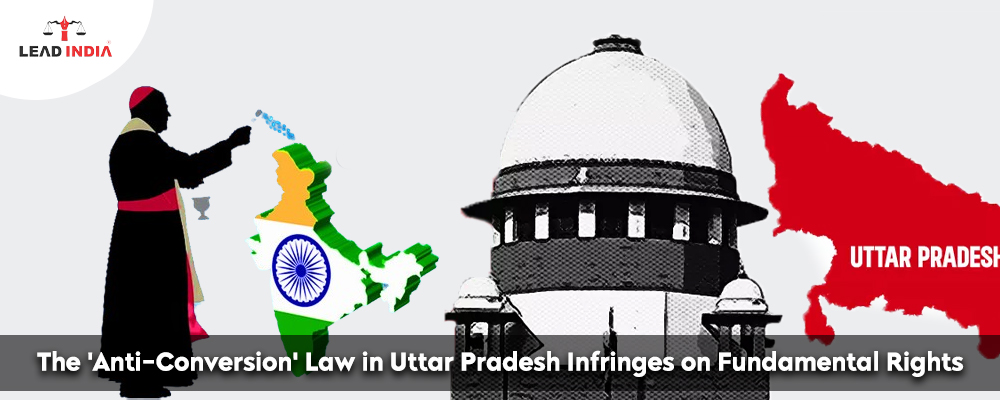The state of Uttarakhand in 2018 introduced the law for providing freedom of religion in the instances of forced religious conversion, conversion by fraud, misrepresentation, coercion, etc. In 2020, the UP government also enacted an ordinance with similar restrictions punishing unlawful conversions for the purpose of marriage.
Uttar Pradesh Prohibition of Unlawful Conversion of Religion Act, 2021 punished the offender with the punishment of 1 – 5 years of imprisonment and a minimum fine in the amount of Rs 15,000. It has a provision of enhanced punishment of 2-10 years of imprisonment and a minimum fine of Rs 25,000. The enhanced punishment would be given if the victim is a woman, a minor, or a person of SC or ST. The Act also punished the offense of mass conversion. The punishment for mass conversion is 3 – 10 years of imprisonment and a minimum fine of Rs 50,000. For repeat offenders, there is a provision of double the relevant punishment. The marriage, which is done for the purpose of unlawful conversion, will be declared void.
Need A Legal Advice
The internet is not a lawyer and neither are you. Talk to a real lawyer about your legal issue

Legal Provisions
- Article 25 of the Indian Constitution talks about freedom of religion. It guarantees the freedom of conscience and the right to freely profess, practice, and propagate religion. This Article is subject to public order, morality, and health. The state can regulate the areligious activity associated with religious activity.
- Article 26 of the Indian Constitution provides the freedom to every religious denomination to manage its own religious affairs. This is also subject to public order, morality, and health.
- Articles 27–30 of the Indian constitution also guarantee the freedom to manage its own religious affairs and set up of educational institutions.
Supreme Court’s View on ‘Anti-Conversion’ Law in Uttar Pradesh
Recently the Court raised the question regarding the validity of the Uttar Pradesh Anti-Conversion Law and stated that it might restrict the fundamental right to religion and Article 25 of the Indian Constitution. The case involved Dr. Rajendra Bihari Lal, the Vice Chancellor of the Sam Higginbottom University of Agriculture, Technology and Sciences (SHUATS) along with other accused. The allegations were that they were involved in forceful religious conversions. They were booked under UP Anti-conversion law. The Court stated that conversion is not a crime unless it involves force, coercion, undue influence, and misrepresentation.
The Allahabad High Court also addressed the issue of religious conversions in India. The High Court states that Article 25 does not talk about the conversions. It only allows for the propagation of religion. Propagation means to spread and promote the religion and not convert a person from one religion to another religion. The court even warned that if this conversion is not curbed then the majority population will convert into a minority population. Throughout the UP, the conversion cases among SC, ST, and economically weaker sections are increasing day by day.
Issues related to Anti – conversion law
- This law violates the fundamental freedom of religion and the principle of secularism. In the S. R. Bommai v. UOI, 1994, The Supreme Court defined the term secularism. It states that secularism is a way of life. It is the attitude of people towards people belonging to other religions.
- It is also associated with the Love Jihad controversy. It even violates Article 21 which is the right to life and Article 14 which is the right to equality.
- The existing laws are also capable of preventing forced conversions. There is no need for an anti-conversion law.
- These laws may be misused to suppress minority religions and also undermine the right to freedom of religion.
For further information, you can contact Lead India. Lead India provides free legal advice, online information, and other various legal assistance. On this platform, you can talk to a lawyer in our firm and can even ask a legal question to our lawyers. We are here to provide you with the solutions to your legal issues. We not only provide online legal support, but we also provide the facility of asking a free specialized legal question.





 Talk to a Lawyer
Talk to a Lawyer